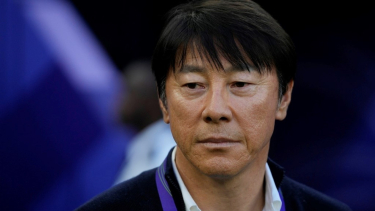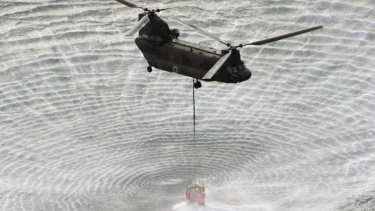- AP Photo/Yomiuri Shimbun
Workers were pumping more than 3 million gallons of contaminated water from Japan's tsunami-ravaged nuclear power complex into the Pacific Ocean on Tuesday, freeing storage space for even more highly radioactive water that has hampered efforts to stabilize the plant's reactors.
The government has also asked Russia for a ship that is used to dispose of liquid nuclear waste as it tries to decontaminate the Fukushima Dai-ichi nuclear complex, whose cooling systems were knocked out by the magnitude-9.0 earthquake and tsunami on March 11. The plant also plans to bring in a floating storage facility.
But these other storage options have been slow to materialize, so the pumping began late Monday. It was expected to take about two days to get most of the less-radioactive water out.
"The measure was to prevent highly radioactive water from spreading. But we are dumping radioactive water, and we feel very sorry about this," Chief Cabinet Secretary Yukio Edano told a news conference Tuesday.
Radioactivity is quickly diluted in the ocean, and government officials said the dump should not affect the safety of seafood in the area.
The crisis has unfolded as Japan deals with the aftermath of twin natural disasters that devastated much of its northeastern coast. Up to 25,000 people are believed to have died and tens of thousands lost their homes.
Since the disaster, water with different levels of radioactivity has been pooling throughout the plant. People who live within 12 miles (20 kilometers) have been evacuated and have not been allowed to return.
The pooling water has damaged systems and the radiation hazard has prevented workers from getting close enough to power up cooling systems needed to stabilize dangerously vulnerable fuel rods.
On Saturday, they discovered a leak where radioactive water was pouring into the ocean.
Radiation exceeding the legal limit has been measured in seawater over the past few weeks, though calculating the exact contamination has vexed the plant's operator, Tokyo Electric Power Co. Japan's nuclear safety agency ordered the utility last week to reanalyze samples; new results released Monday showed unchanged or lower levels of radiation than previously reported.
The less-radioactive water that officials are purposely dumping into the sea is up to 500 times the legal limit for radiation.
"We think releasing water with low levels of radiation is preferable to allowing water with high levels of radiation to be released into the environment," said Junichi Matsumoto, a TEPCO official.
The need to make room for the highly radioactive water became more urgent when TEPCO discovered the extent to which it was leaking into the ocean, Matsumoto said.
Workers need to get rid of the highly radioactive water, but first they need somewhere safe to put it. Much of the less-radioactive water being dumped into the sea is from the tsunami and had accumulated in a nuclear waste storage building.
The building is not meant to hold water, but it's also not leaking, so engineers decided to empty it so they can pump in the more-radioactive water. The rest of the water going into the sea is coming from a trench beneath two of the plant's six reactors.
Also Monday, a spokesman for the Russian nuclear agency Rosatom, Sergei Novikov, told reporters that Japan has requested Russia send it a vessel used to decommission nuclear submarines.
Novikov said Moscow was awaiting the answers to some questions before granting the request.
The vessel, called the Landysh, would help dispose of liquid nuclear waste from decommissioned submarines.
More water keeps pooling because TEPCO has been forced to rely on makeshift methods of bringing down temperatures and pressure by pumping water into the reactors and allowing it to gush out wherever it can. It is a messy process, but it is preventing a full meltdown of the fuel rods that would release even more radioactivity into the environment.
"We must keep putting water into the reactors to cool to prevent further fuel damage, even though we know that there is a side effect, which is the leakage," said Hidehiko Nishiyama, a spokesman for Japan's Nuclear Safety and Industrial Agency. "We want to get rid of the stagnant water and decontaminate the place so that we can return to our primary task to restore the sustainable cooling capacity as quickly as possible."
Engineers have been using unusual methods to try to stop the more highly radioactive water from leaking into the sea.
An attempt to seal a crack in a maintenance pit discovered Saturday with concrete failed, and clogging it with a special polymer mixed with sawdust and shredded newspapers didn't work, either.
They dumped milky white bath salts into the system around the pit Monday to try to figure out the source of the leak, but it never splashed out into the ocean.
In the meantime, workers plan to install screens made of polyester fabric to try to stop some of the contamination in the ocean from spreading.
Although the government eventually authorized the dumping of the less-radioactive water, Edano said officials were growing concerned about the sheer volume of radioactive materials spilling into the Pacific and would be investigating its effects. It is not clear how much water has leaked in addition to what is being dumped purposely.
Experts said Monday that at this point, they don't expect the discharges to pose widespread danger to sea animals or people who might eat them.
"It's a very large ocean" with considerable powers of dilution, noted William Burnett of Florida State University.
Very close to the nuclear plant - less than half a mile (800 meters) or so - sea creatures might be in danger of problems like genetic mutations if the dumping goes on a long time, he said. But there shouldn't be any serious hazard farther away "unless this escalates into something much, much larger than it has so far," he said.
--
By Mari Yamaguchi and Yuri Kageyama
Associated Press

























